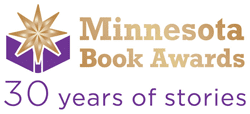Each day leading up to the 30th annual Minnesota Book Awards Ceremony, we’ll be featuring an exclusive interview with one of our 36 finalists. Learn more about these incredible local writers and gear up to see the winners announced live in person April 21.
Interview with Carter Meland, author of Stories for a Lost Child
Category: Novel & Short Story, sponsored by Fitzgerald in Saint Paul

It feels like I’ve stumbled into a party where the cool kids hang out and it’s only a matter of time until someone realizes that my invite was for the Minnesota Boob Awards, not the Book Awards. Then I remember that in the Anishinaabe origin story it is the humble little muskrat who swims down through the flood and brings up the dirt from which the earth is fashioned. So maybe I feel like a muskrat, smaller than the other animals but still capable of getting some good work done. That’s a complicated way to say I’m humbled to be in the same room with all these great writers.
What does writing mean to you?
As a kid, inspired by Spielberg’s CE3K, I was sure I’d be a filmmaker when I grew up. But film was expensive back in my kid days – back when even a video camera cost as much as a car. Ink and paper were cheap, so writing has become a way to generate images that help me help readers see what characters feel when they are caught up in some sort of situation. I think that’s what writing means to me: creating images in language that resonate with the sorts of ideas and emotion that a movie like CE3K offered me.
Why are stories important for our communities?
Stories teach, transform, and heal – and when we live in a society, and within a history, where the stories of differing people and other-than-human beings are suppressed or marginalized, we foreclose on recognizing the complexity of the diversity of our lived worlds. In the best stories we cease to be ourselves and become someone else – we let go of accustomed perceptions and open ourselves to new ones, and emerge transformed. Communities can do the same, must do the same. Stories awaken compassion, one hopes. Thriving societies mature through compassionate stories.
Tell us something people might not know about you.
I built a wood-fired sauna in my backyard [address undisclosed], mostly from recycled materials, though I did have to buy the cedar for the interior, as well as a real Finnish sauna stove that came with a hundred pounds of real Finnish mountain, broken into handy fist-sized chunks I can heat up and pour water over. The sweatbox, as I call it, is a real nice place to pass an evening thinking great thoughts about how the Ojibwe language sees this world we live in or just to chill, so to speak, with the young adults I call my son and daughter.
What do you love about libraries?
Having worked in the Hennepin County Library system through most of my young adulthood, I can honestly say I wouldn’t be a writer without libraries. Handling hundreds of books every week, year after year, gave me an opportunity to soak up all sorts of ideas about language and what writers can do with it, an opportunity that was extended by the great people I worked with in the library system and interesting and engaging patrons who pointed me in the direction of new writers. A library, for me, is like a great conversation about the creative power of language.
More about Carter Meland
A tall, left-handed man of White Earth Anishinaabe heritage, Carter Meland takes writing seriously, but does so with good humor. His novel, Stories for a Lost Child, invokes the waters of Lake Superior and the Mississippi River, and the deep woods voice of Misaabe (Bigfoot) to help his characters make sense of the problems they face in their lives. By day he teaches students in American Indian Studies at the U of MN about the wicked smart, moving, and profound things that Native writers have to say about the world and by night he tries to rise to the standards they set.
See the winners announced live at the 30th annual Minnesota Book Awards Ceremony!


